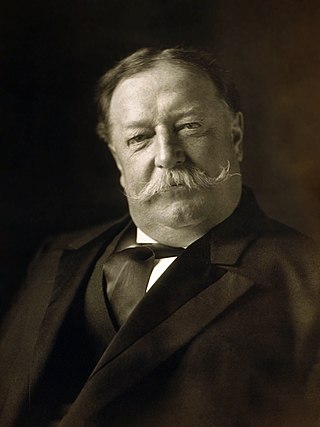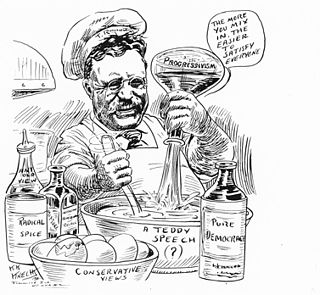
Theodore Roosevelt Jr., often referred to as Teddy or T. R., was an American politician, soldier, conservationist, historian, naturalist, explorer and writer who served as the 26th president of the United States from 1901 to 1909. He previously was involved in New York politics, including serving as the state's 33rd governor for two years. He was the vice president under President William McKinley for six months in 1901, assuming the presidency after McKinley's assassination. As president, Roosevelt emerged as a leader of the Republican Party and became a driving force for anti-trust and Progressive policies.

William Howard Taft was the 27th president of the United States, serving from 1909 to 1913, and the tenth chief justice of the United States, serving from 1921 to 1930, the only person to have held both offices. Taft was elected president in 1908, the chosen successor of Theodore Roosevelt, but was defeated for reelection in 1912 by Woodrow Wilson after Roosevelt split the Republican vote by running as a third-party candidate. In 1921, President Warren G. Harding appointed Taft to be chief justice, a position he held until a month before his death.

The 1912 United States presidential election was the 32nd quadrennial presidential election, held on Tuesday, November 5, 1912. Democratic Governor Woodrow Wilson of New Jersey unseated incumbent Republican President William Howard Taft while defeating former President Theodore Roosevelt and Socialist Party nominee Eugene V. Debs.

The history of the United States from 1865 to 1917 was marked by the Reconstruction era, the Gilded Age, and the Progressive Era, and includes the rise of industrialization and the resulting surge of immigration in the United States.

In the history of United States foreign policy, the Roosevelt Corollary was an addition to the Monroe Doctrine articulated by President Theodore Roosevelt in his State of the Union address in 1904, largely as a consequence of the Venezuelan crisis of 1902–1903. The corollary states that the United States could intervene in the internal affairs of Latin American countries if they committed flagrant wrongdoings that "loosened the ties of civilized society".

The Progressive Era (1901–1929) was a period in the United States during the early 20th century of widespread social activism and political reform across the country. Progressives sought to address the problems caused by rapid industrialization, urbanization, immigration, and political corruption as well as the enormous concentration of industrial ownership in monopolies. Progressive reformers were alarmed by the spread of slums, poverty, and the exploitation of labor. Multiple overlapping progressive movements fought perceived social, political, and economic ills by advancing democracy, scientific methods, and professionalism; regulating business; protecting the natural environment; and improving working and living conditions of the urban poor.
Progressivism in the United States is a political philosophy and reform movement. Into the 21st century, it advocates policies that are generally considered social democratic and part of the American Left. It has also expressed itself with right-wing politics, such as New Nationalism and progressive conservatism. It reached its height early in the 20th century. Middle/working class and reformist in nature, it arose as a response to the vast changes brought by modernization, such as the growth of large corporations, pollution, and corruption in American politics. Historian Alonzo Hamby describes American progressivism as a "political movement that addresses ideas, impulses, and issues stemming from modernization of American society. Emerging at the end of the nineteenth century, it established much of the tone of American politics throughout the first half of the century."

The presidency of Theodore Roosevelt started on September 14, 1901, when Theodore Roosevelt became the 26th president of the United States upon the assassination of President William McKinley, and ended on March 4, 1909. Roosevelt had been the vice president for only 194 days when he succeeded to the presidency. A Republican, he ran for and won by a landslide a four-year term in 1904. He was succeeded by his protégé and chosen successor, William Howard Taft.

The 1912 Republican National Convention was held at the Chicago Coliseum, Chicago, Illinois, from June 18 to June 22, 1912. The party nominated President William Howard Taft and Vice President James S. Sherman for re-election for the 1912 United States presidential election.

The Progressive Party, popularly nicknamed the Bull Moose Party, was a third party in the United States formed in 1912 by former president Theodore Roosevelt after he lost the presidential nomination of the Republican Party to his former protégé turned rival, incumbent president William Howard Taft. The new party was known for taking advanced positions on progressive reforms and attracting leading national reformers. The party was also ideologically deeply connected with America's radical-liberal tradition.
These are the references for further information regarding the history of the Republican Party in the U.S. since 1854.

The Fourth Party System was the political party system in the United States from about 1896 to 1932 that was dominated by the Republican Party, except the 1912 split in which Democrats captured the White House and held it for eight years.
This bibliography of Richard Nixon includes publications by Richard Nixon, the 37th president of the United States, and books and scholarly articles about him and his policies.
Robert Hugh Ferrell was an American historian. He authored more than 60 books on topics including the U.S. presidency, World War I, and U.S. foreign policy and diplomacy. One of the country's leading historians, Ferrell was widely considered the preeminent authority on the administration of Harry S. Truman, and also wrote books about half a dozen other 20th-century presidents. He was thought by many in the field to be the "dean of American diplomatic historians", a title he disavowed.

The presidency of William Howard Taft began on March 4, 1909, when William Howard Taft was inaugurated as 27th president of the United States, and ended on March 4, 1913. Taft was a Republican from Ohio. The protégé and chosen successor of President Theodore Roosevelt, he took office after easily defeating Democrat William Jennings Bryan in the 1908 presidential election. His presidency ended with his defeat in the 1912 election by Democrat Woodrow Wilson.

Theodore Roosevelt (1858–1919) was the 26th President of the United States (1901–1909) and also served as Governor of New York and Vice President. He is known for becoming a leading spokesman for his version of progressivism after 1890. However, author Daniel Ruddy argues in his book Theodore the Great: Conservative Crusader that Roosevelt was actually a "populist conservative" and a "Hamiltonian"—a conservative in the eighteenth century sense of the word. Similarly, Francis Fukuyama identifies Roosevelt, together with Alexander Hamilton, as part of a tradition of a strong-state conservatism in the United States.

The Imperial Cruise is a non-fiction book authored by James Bradley. In the book Bradley examines American policy in the Pacific during the presidency of Theodore Roosevelt, and a surrounding a secret diplomatic/Congressional mission to Asia conceived by Roosevelt which would affect United States involvement in Asia. The material also covers a wide array of other cultural factors that loosely relate to this, the largest diplomatic delegation ever sent to Asia in U.S. history. The book asserts that Roosevelt's diplomatic mistakes constituted the original encouragement for the Japanese imperialism that ultimately backfired on the United States and led to the war in the Pacific, and acted as a catalyst in the fomentation of many subsequent events in Asia, including the Chinese Communist Revolution, the Korean War, and even the current state of U.S.-Asia affairs today in the 21st century. In support of the book's themes, Bradley presents evidence in the form of Roosevelt's personal letters and pictures. Nevertheless, the book's historical accuracy has proved controversial, with some historians, specialists and reviewers pointing out Bradley's methods as faulty.
The following are some of the books and papers which have been written concerning William Howard Taft, the 27th president of the United States:
This bibliography of Franklin D. Roosevelt is a selective list of scholarly works about Franklin D. Roosevelt, the thirty-second president of the United States (1933–1945).

The foreign policy of the Theodore Roosevelt administration covers American foreign policy from 1901 to 1909, with attention to the main diplomatic and military issues, as well as topics such as immigration restriction and trade policy. For the administration as a whole see Presidency of Theodore Roosevelt. In foreign policy, he focused on Central America where he began construction of the Panama Canal. He modernized the U.S. Army and expanded the Navy. He sent the Great White Fleet on a world tour to project American naval power. Roosevelt was determined to continue the expansion of U.S. influence begun under President William McKinley (1897–1901). Roosevelt presided over a rapprochement with the Great Britain. He promulgated the Roosevelt Corollary, which held that the United States would intervene in the finances of unstable Caribbean and Central American countries in order to forestall direct European intervention. Partly as a result of the Roosevelt Corollary, the United States would engage in a series of interventions in Latin America, known as the Banana Wars. After Colombia rejected a treaty granting the U.S. a lease across the isthmus of Panama, Roosevelt supported the secession of Panama. He subsequently signed a treaty with Panama which established the Panama Canal Zone. The Panama Canal was completed in 1914, greatly reducing transport time between the Atlantic Ocean and the Pacific Ocean. Roosevelt's well-publicized actions were widely applauded.












